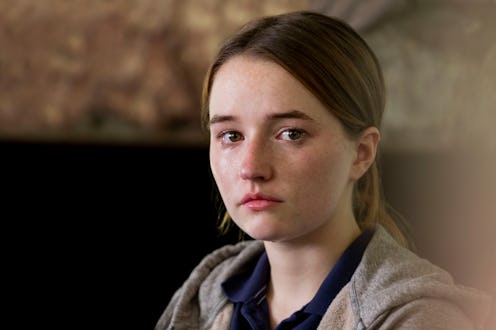Entertainment
The New 'Unbelievable' Trailer Reveals A Lesser Known Aspect Of Trauma

Sexual assault survivors often face an uphill battle when it comes to reporting what happened to them, from getting law enforcement to believe them to dealing with the social stigma from their family and peers. Netflix's new drama Unbelievable aims to explore the myriad ways that society and the criminal justice system fails victims, through the lens of a real life case.
Unbelievable focuses on teenager Marie Adler (Kaitlyn Dever), who files a police report claiming she was sexually assaulted by an intruder in her home. But the investigating detectives, and even Marie's own family and classmates, doubt her story. "No signs of forced entry, no DNA, not a single neighbor heard or saw a thing," a voice in the trailer says. Marie herself seems to struggle with keeping her memories in order, and in the trailer we see the constant questioning wear on Marie. So Marie, faced with everyone's skepticism, then says that she perhaps made it all up.
"Maybe I blacked it out," Marie says tearfully in the trailer, when the detective calls her out for story inconsistencies. News stations begin to widely report that her claims were fabricated. Later, Marie admits to her peers that she did in fact tell the truth the first time, but the damage is already done. They don't appear to believe her. "Even with good people, if the truth is inconvenient, they don't believe it," Marie tells us.
Marie's story is actually inspired by real life events. In 2015, T. Christian Miller and Ken Armstrong co-published a ProPublica Pulitzer Prize-winning article with The Marshall Project titled "An Unbelievable Story of Rape." It told the story of Marie, a young Washington state woman charged with a misdemeanor for filing a false police report after she admitted she lied about being raped. But Marie wasn't lying; she was the victim of a serial rapist from Colorado, who was eventually caught by two detectives and sentenced to 327 years in prison.
The local police department was found guilty of "bullying" and "hounding" Marie to recant her statement. Sgt. Gregg Rinta, a sex crimes supervisor, wrote that the cops threatening jail and a possible withdrawal of housing assistance if Marie failed a polygraph test was "coercive, cruel, and unbelievably unprofessional. I can’t imagine ANY justification for making these statements.”
Marie's story is depressing, but it's one that's sadly all too common for sexual assault victims. RAINN reports that only 230 out of every 1,000 sexual assaults are reported to police, and only 5 out of 1000 perpetrators will actually serve any jail time. Victims simply do not trust the police will do anything to help them get justice.
Marie's spotty memory of her assault is also true to life. Jim Hopper, who trains investigators on the neurobiology of sexual assault, writes in Time that trauma impairs memory recall: "In states of high stress, fear or terror like combat and sexual assault, the prefrontal cortex is impaired – sometimes even effectively shut down ... When the executive center of the our brain goes offline, we are less able to willfully control what we pay attention to, less able to make sense of what we are experiencing, and therefore less able to recall our experience in an orderly way."
Unbelievable deals with incredibly heavy subject matter, but shedding further light on the topic of sexual assault is the first step towards a more equitable society that believes women.
If you or someone you know has been sexually assaulted, call the National Sexual Assault Telephone Hotline at 800-656-HOPE (4673) or visit online.rainn.org.